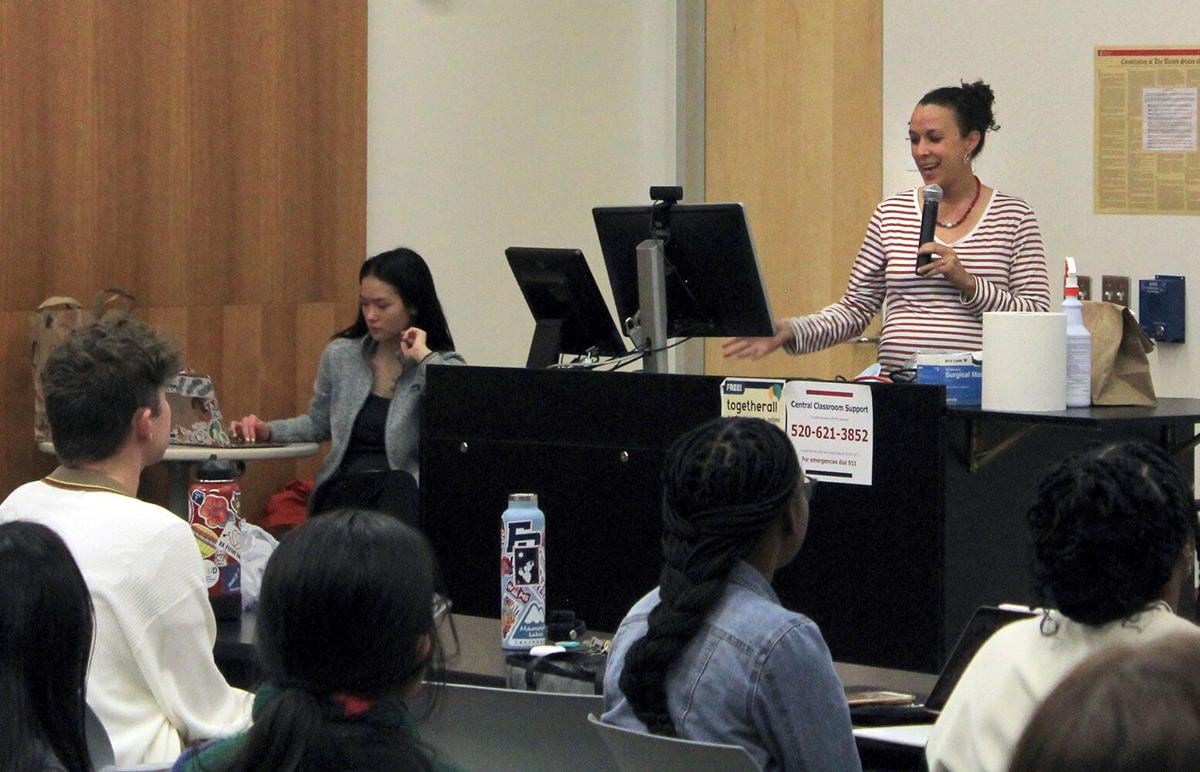Alex Jaeger placed the last of the blood pressure cuffs inside the car and prepared herself for the two-hour drive.
Jaeger is president of the University of Arizona’s chapter of the Flying Samaritans, an organization for undergraduate students that takes monthly road trips to Agua Prieta, Sonora, to provide free medical and dental care.
Each month, the group of students and health practitioners, including physicians and dentists, hosts a one-day health clinic for residents of Agua Prieta.
The clinics not only help the residents of Agua Prieta, but also provide valuable real-life experience for students wanting to pursue careers in medicine. Volunteers have the opportunity to interact with patients, do physical exams and learn firsthand under the guidance of practicing medical professionals.
Jaeger, a senior majoring in neuroscience, looks forward to spending her Saturday helping others.
Lisette Lecorgne, a nurse practitioner who worked at the UA’s Campus Health center, served as an advisor to the UA chapter of Flying Samaritans from 2008-22. She has been a part of the Flying Samaritans since the early 1990s and said she has seen firsthand how the organization helps the Agua Prieta community and the students involved in the club.
“It’s just such a gracious sharing of cultures, of ideas, of information that I think is so valuable,” Lecorgne said. “That is the clinical component of health care to me that has always been so important.”
The parent organization was established in 1961 after a small plane’s engine failure over Baja California, Mexico, led to an emergency landing in El Rosario, where the community aided the plane’s occupants. After the occupants returned to their intended destination in San Diego, they organized a relief flight to provide supplies like food and clothing to thank the community for its help.
This gesture of goodwill eventually developed into the Flying Samaritans, originally called the “Flying Angels” by the residents of El Rosario.
Outside of monthly clinics, the UA chapter also engages in local outreach opportunities, including hosting blood drives, organizing volunteering opportunities at Tucson Medical Center, and handing out care packages to Tucson’s homeless population.
“We’re always trying to work on figuring out how we’re able to give back to the community ... with local outreach and public health,” Jaeger said. “I feel like there is a niche for any student or any individual interested, as well.”
Another key facet of the UA’s Flying Samaritans is its bilingual component. Members who speak Spanish interpret and translate for patients and providers. To help with communication, the group has a committee that meets biweekly to focus on improving Spanish skills among members.
One member of the UA’s Flying Samaritans is Arturo Lujan, a medical student who serves as a co-president of the organization from the medical school side.
Lujan grew up in Agua Prieta and lived five blocks from where the club sets up its clinics. This connection has made the club’s mission even more personal to him and has allowed him to directly impact lives in his hometown.
“Because I grew up in a family that did not have a lot of medical resources, I experienced firsthand the health care deficits in Agua Prieta,” Lujan said. “It just means a lot to be able to serve an area of the community where there’s a high concentration of people that need health-care services and are not able to afford going to a hospital.”
Though the organization is successful in its mission to provide free access to health care in Agua Prieta, Jaeger said there are challenges on the logistical end that make the clinics tough to coordinate. Juggling the coordination of volunteers and practitioners, and getting needed approval through the UA Travel Registry, requires teamwork and communication.
The organization supports its endeavors financially through fundraising events, club dues and donations. Recently, the club has also gotten funding from the Associated Students of the University of Arizona to go towards acquiring reusable medical supplies such as glucometers and blood pressure cuffs, Jaeger said.
The organization’s next Agua Prieta clinic takes place on April 22, and Jaeger said the group is always looking for more volunteers who are interested in helping underserved communities.
Get a roundup of solutions reporting from the Arizona Daily Star at linktr.ee/starsolutions. Video by Caitlin Schmidt / Arizona Daily Star.





